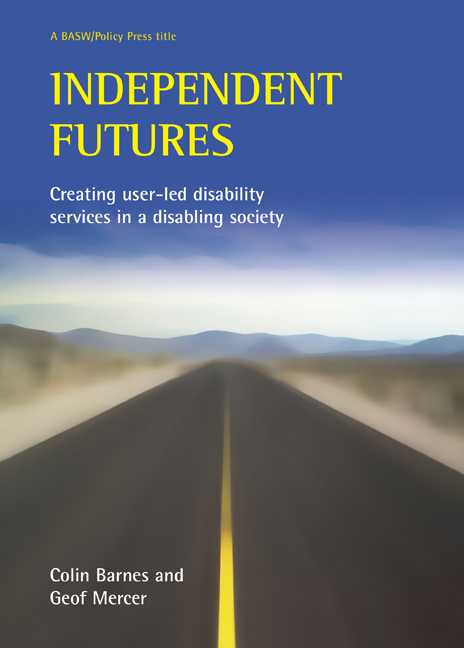Book contents
- Frontmatter
- Contents
- List of figures and tables
- Acknowledgements
- Notes on the authors
- one Examining user-led services
- two Traditional approaches: disability policy and the welfare state
- three Disability activism and the struggle for independent living
- four Researching user-led organisations
- five User-led organisations: building an alternative approach
- six Service design and delivery: opportunities and constraints
- seven Service users’ views and experiences
- eight Politics and campaigning
- nine Policy change or retrenchment?
- ten Future directions
- References
- Index
one - Examining user-led services
Published online by Cambridge University Press: 15 January 2022
- Frontmatter
- Contents
- List of figures and tables
- Acknowledgements
- Notes on the authors
- one Examining user-led services
- two Traditional approaches: disability policy and the welfare state
- three Disability activism and the struggle for independent living
- four Researching user-led organisations
- five User-led organisations: building an alternative approach
- six Service design and delivery: opportunities and constraints
- seven Service users’ views and experiences
- eight Politics and campaigning
- nine Policy change or retrenchment?
- ten Future directions
- References
- Index
Summary
Introduction
An extraordinary politicisation of disabled people began to gather momentum in Britain during the 1960s. It ranged from demonstrations and protest campaigns to the growth of self-help groups and disabled people's own organisations. The driving force was a deep sense of injustice fuelled by poverty, discrimination and social exclusion. Despite the expectations of improvement associated with the welfare state reforms of the 1940s, the ‘reality’ of living with an accredited impairment, long-term health condition or ‘disability’ was very different.
How was this wide gulf between the life chances of disabled and non-disabled people explained or justified? The dominant account equated ‘disability’ with disease and impairment as defined by an established medical profession. This constituted a ‘personal tragedy’ in that an individual's ‘disability’, and particularly any ensuing inability to function ‘normally’, determined their social exclusion and dependence on family and friends, charity, and the statutory and voluntary sector health and social ‘care’ services (UPIAS, 1976; Oliver, 1983).
Disabled activists began to challenge this exclusive preoccupation with individual, medicalised ‘deficiencies’, and explored instead an alternative ‘social barriers’ or ‘social model’ approach to disability. This shifted attention to the ‘disabling’ impact of social and environmental barriers experienced by people with designated impairments and viewed as ‘disabled’. Mainstream statutory and voluntary social and welfare services were criticised for their failure to provide appropriate support services to enable disabled people to lead ‘ordinary’ everyday lives. Rather, they reinforced the dependence of people with impairments and perpetuated their separation from the rest of society.
One radical option for disabled people was to develop organisations that they ran and controlled. This book explores the experiences of user-led (that is, user-controlled) service organisations in Britain. It offers a revealing picture of disabled people's attempts to change the direction of welfare services and facilitate moves towards ‘independent living’. In this introductory chapter, we outline, first, the clash of theoretical perspectives that underpin the analysis of disability, welfare policy and practice, and second, our approach to undertaking research with user-led organisations. The final section outlines the major issues raised in subsequent chapters.
Re-thinking disability
At least since the 17th century, those individuals regarded as unable to look after themselves, including the broad category of the ‘sick and infirm’, had access to a mixed economy of welfare support.
- Type
- Chapter
- Information
- Independent FuturesCreating User-Led Disability Services in a Disabling Society, pp. 1 - 8Publisher: Bristol University PressPrint publication year: 2006



